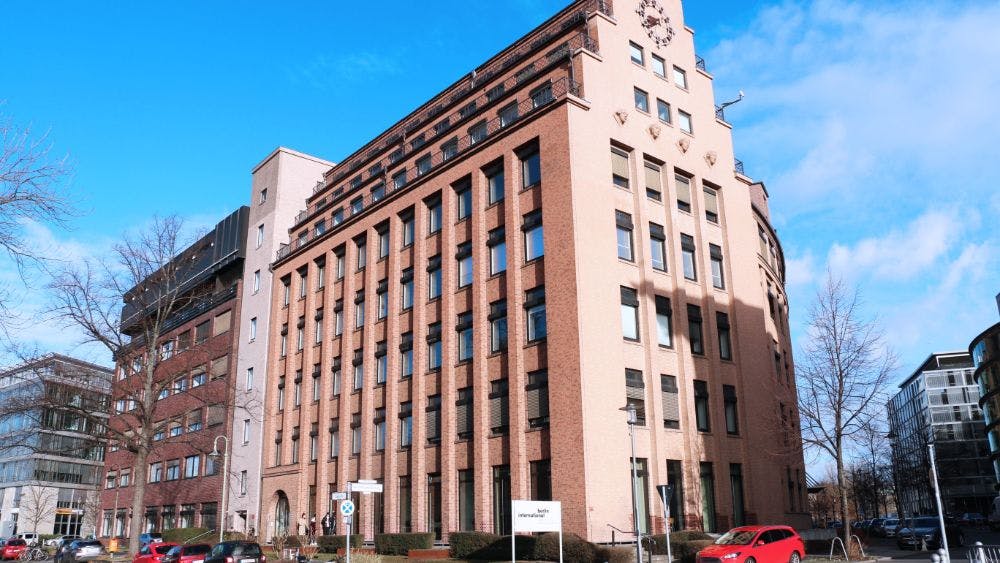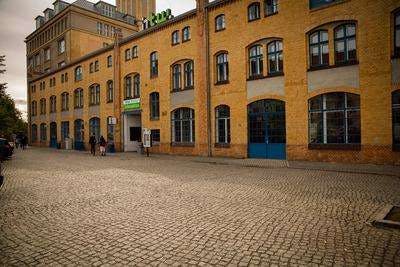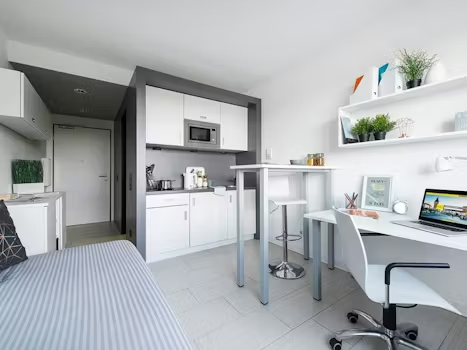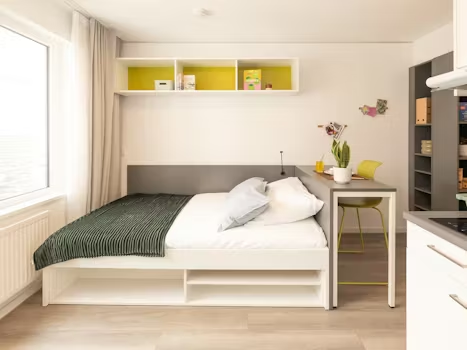
Student Accommodation
in
Germany

Popular Universities
Popular Properties
Finding the Perfect Student Housing in Germany
Germany is one of the top destinations for international students, and it’s easy to see why. With a reputation for high-quality education, cutting-edge research, and a diverse, student-friendly atmosphere, it’s no wonder so many students from all over the world are flocking to German universities. But one of the first things you'll need to figure out is where to live. Student accommodation in Germany can range from budget-friendly dormitories to more private student apartments in Germany.
Finding the right student housing in Germany can significantly impact your overall experience, so it’s essential to start planning early. Whether you're coming from India, Europe, or elsewhere, this guide will walk you through everything you need to know about student accommodation in Germany—from types of housing to costs, and the best cities to live in.
Types of Student Housing in Germany
Germany offers a wide range of student accommodation options to suit different budgets, preferences, and lifestyles. Whether you're looking for a basic student dorm, a private student apartment, or a shared flat with other students, there’s something for everyone.
1. Student Dormitories:
Student dormitories are the most common and budget-friendly housing option in Germany. Managed by Studierendenwerk (Student Services), these dorms provide affordable, basic accommodation, often located close to university campuses. Dormitories typically offer either single rooms in shared apartments or entire apartments with shared kitchens and bathrooms. It’s a fantastic way to meet new people and experience life as a student. However, dorms can be competitive, and demand often exceeds availability, so make sure to apply early.
2. Student Apartments:
For those who prefer more privacy and independence, student apartments in Germany are a great option. These are small, fully furnished one-room flats, often with a private kitchenette and bathroom. While they cost more than dormitories, student apartments offer a lot of freedom and are ideal for those who want to live alone or with minimal shared space. They’re often located in quieter neighbourhoods, offering a peaceful retreat after a busy day at uni.
3. Shared Flats:
WGs (short for Wohngemeinschaft) are shared apartments where multiple students rent the space together. Each person has their own private bedroom, but you’ll share the kitchen, living area, and bathroom. It’s one of the most common forms of accommodation for students and a popular choice for international students. WGs are a budget-friendly way to live independently while still having the social aspect of living with others.
4. Private Apartments:
For students who prefer more space, privacy, and independence, renting a private apartment is a good option. These apartments are typically more expensive than dorms and WGs, but they offer a high level of freedom and privacy. They are usually fully furnished and are rented directly from landlords, often through property management companies or online platforms.
5. Student Hostels:
Although not as common for long-term stays, student hostels in Germany can be a good option for short-term accommodation. They are especially useful when you arrive in Germany before securing your permanent housing. Hostels are affordable, but the amenities are usually basic, and the rooms tend to be shared.
Best Student Accommodation in Germany
When it comes to the best student accommodation in Germany, the “best” place often depends on your preferences, budget, and the city where you're studying. However, some cities are renowned for offering excellent housing options for students, both in terms of affordability and proximity to universities.
1. Berlin: A Hub for Creativity and Diversity
Berlin is the capital and one of the most exciting student cities in Europe. Whether you're studying at Humboldt University, Berlin Technical University, or one of its other prestigious institutions, you'll find a variety of student housing options. Berlin is also known for its affordable rent compared to other major European capitals like London or Paris.
There’s a strong student community here, with plenty of student hostels in Germany and shared flats in vibrant neighborhoods like Kreuzberg and Neukölln. Private student apartments in Berlin are slightly more expensive, especially near central areas like Mitte, but they offer greater privacy and independence. For students on a budget, cheap accommodation in Germany for international students can often be found in the city’s outskirts, with excellent public transport connections to the city center.
2. Munich: High Quality of Life (But Expensive)
Munich is often considered one of the best places to study in Germany, thanks to its high quality of life and top-tier universities like LMU Munich and Technical University of Munich (TUM). However, Munich is also one of the most expensive cities in Germany when it comes to Munich student accommodation. Student dormitories are relatively affordable and in high demand, and you may have to get creative with finding affordable student housing in Germany. For those who can afford it, private apartments and shared flats can be found in the city center, though rent prices are on the higher side. Students looking for cheap student accommodation in Germany should consider living in areas like Giesing or Pasing, where rents are a bit lower but still close to university campuses.
3. Hamburg: The Vibrant Port City
Hamburg, Germany’s second-largest city, is a lively, multicultural hub with a thriving student population. Universities like Hamburg University of Technology and University of Hamburg offer excellent academic programs. Student accommodation in Hamburg is widely available, with many affordable options for international students.
Rent prices are more reasonable than Munich, and you can easily find shared flats or student apartments in Germany. The city is well-connected by public transport, so even if you live in the suburbs, getting to class will be easy and fast. The neighborhoods of Altona and St. Pauli are popular with students, offering both affordable and convenient accommodation options.
Student Accommodation Locations in Germany
When choosing your student housing in Germany, location is key. Whether you want to be close to the campus, live in a vibrant city center, or find something quieter on the outskirts, here are a few of the most popular locations for student accommodation:
1. Near Campus
If you prefer to live close to campus, there are many student dormitories and student apartments in Germany located just a short walk or tram ride away from major universities. This is the most convenient option for students who want to minimize their commute and be close to university libraries, sports facilities, and student events.
2. City Center
Living in the city center is great if you enjoy being at the heart of the action. You'll be close to cafes, bars, shops, and cultural attractions. The downside is that rent prices tend to be higher in the city center, but the convenience and vibrant atmosphere can make it worth the extra cost.
3. Suburban Areas
If you want to save money, consider looking for student accommodation in the suburbs or outskirts of the city. While rents tend to be lower, you’ll still have good access to public transport, making it easy to get to your university and city center. Suburbs offer a quieter, more relaxed environment and may be ideal if you’re focusing on your studies and prefer a bit of peace and quiet.
How Much is the Cost of Accommodation for Students in Germany?
The cost of student accommodation in Germany varies depending on the city and the type of housing you choose. On average, students can expect to pay:
- Student Dormitories: €250–€450 per month
- Shared Flats (WG): €300–€600 per month
- Private Apartments: €500–€900 per month
Rent is higher in major cities like Munich, Berlin, and Hamburg, but more affordable options are available in smaller cities like Leipzig and Bremen. If you're looking for cheap accommodation in Germany for international students, you'll have more luck in cities with a lower cost of living.
Cost of Living in Germany
The cost of living in Germany is generally lower than in other Western European countries like the UK or France. However, as with accommodation, costs can vary depending on the city you live in. Here’s a breakdown of what you can expect to spend:
1. Food: €150–€250 per month
You can save a lot by cooking at home, but university cafeterias (Mensa) offer affordable meal options.
2. Public Transportation: €30–€100 per month
Germany’s public transport system is excellent, and most cities offer student discounts or travel passes.
3. Health Insurance: €80–€100 per month
Health insurance is mandatory for all students in Germany.
4. Entertainment: €50–€150 per month
This depends on your lifestyle, whether you enjoy going out, attending events, or exploring the city.
On average, international students should budget around €700 to €1,100 per month for their living expenses in Germany, including rent, food, transport, and leisure activities.
Best Universities in Germany
Germany is home to some of the world’s best universities, known for their academic excellence, research facilities, and student life. Here are the top universities in Germany:
- Ludwig Maximilian University of Munich (LMU) – One of the oldest and most prestigious universities in Germany, known for its research and academic excellence.
- Technical University of Munich (TUM) – A global leader in engineering, technology, and natural sciences.
- Heidelberg University – Germany’s oldest university with an outstanding reputation in humanities, life sciences, and social sciences.
- Humboldt University of Berlin – Known for its high research standards and academic diversity.
- University of Freiburg – A leading institution in life sciences and natural sciences, with a focus on interdisciplinary research.
These universities are located in major student cities, and their student populations contribute to the diverse and dynamic atmosphere of each city.























